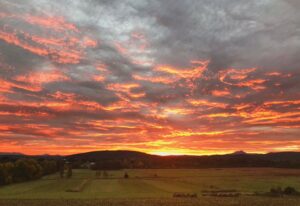All Saints’, Dorval
November 21, 2021

Sunrise in South Burlington, VT, October 6, 2018. Photo by Ed Coleman on Twitter.
One who rules over people justly, ruling in the fear of God, is like the light of morning, like the sun rising on a cloudless morning, gleaming like the rain on the grassy land.
This is not the language of kingship that we’re used to from the Bible. In Scripture, the identity and legacy of the Davidic kings is inescapably bound up with the holiness of the City of Jerusalem and its Temple. The vision from the Revelation to John, of Christ coming again and ruling in glory, is thoroughly urban, down to the detailed descriptions of the city’s twelve gates, each made of a different precious stone.
But in this brief passage from Samuel, claiming to be the last words of King David (although there are numerous other passages that also claim to be the last words of King David …), the monarchy is not described in terms of city walls and thrones and temples. Instead, we have this astonishingly concise and yet vivid image of the sun rising over a dew-laden meadow, with no buildings or people mentioned, simply the daily cycles of the natural world.
Sun, rain, soil: these things combine to create the conditions for plants, and the animals that feed on them, to flourish. This is a fruitful landscape, one in balance, with enough but not too much of everything that is needed. The just and righteous king’s rule is like this: in it, the people have enough of everything they need.
David, of course, regardless of the everlasting covenant and unbroken inheritance that God has promised him, fell well short of this ideal. And this feast of the Reign of Christ can sometimes come in for criticism on that basis: human kings are so very fallible, is it really a good idea to hold up the metaphor of the king as a way of thinking about God?
But I think that approaches the question from the wrong end. The problem is not the kingship of Christ, but rather the failure of its imitators to live up to that ideal of kingship. For the writers of the New Testament, the point of Christ being the true King was that Caesar therefore was not. And here, in David’s “last words” we have that ideal: the ruler who truly fears and follows God, and therefore rules with the same benevolence as the sun touching the dew-wet grass on a cloudless morning, blessing the whole land with fruitfulness and light.
Because the sun cannot change or be corrupted. It does what it does, pouring out light upon the earth with joyful abundance, regardless of how the creatures touched by its rays may behave. And the whole ecosystem, the soil and the dew and the grass and the morning showers, likewise carries on doing what it does in response. They can be altered by human interference, but the natural world will never, in and of itself, be anything other than balanced, fruitful, nourishing, holding within its cycles of birth and death, growth and decay, every creature and organism that lives. And it is this image that expresses Christ’s kingship, not that of the violent, volatile human ruler throwing the system out of balance, using his power for self-aggrandizement and greed.
This feast is the final Sunday of the liturgical year, and we are marking it in a new and different way by singing hymns from each season, beginning with Christmas and ending with Advent, reminding ourselves that Christ is King, Christ reigns, not just now but always, from the beginning to the end, as the Alpha and Omega. The cycle repeats, over and over, just as the cycles of nature do, and God is present and reigning in all of it.
Our final hymn today, the one that carries us over the bridge from the end of the liturgical year back to its beginning, is a paraphrase of chapter 35 of Isaiah, a chapter in which all of nature rejoices at the restoration of God’s people to their homeland. We will sing these words:
In the desert, tree take root,
fresh from God’s creation;
plants and flowers and sweetest fruit,
join the celebration;
rivers spring up from the earth,
barren lands adorning.
Valleys, this is your new birth;
mountains, greet the morning!
All creation rejoices together at the coming of its true and only King, the King above all mortal kings, who can no more rule wrongly or falsely than the sun could refuse to shine.
Amen.
Leave a Reply